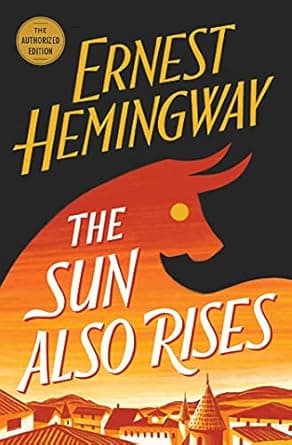
Book Stats
513
Upvotes
67
Downvotes
+446
Net Score
The Sun Also Rises
by Ernest Hemingway
Description
Hemingway's masterpiece about the Lost Generation in post-WWI Europe, capturing the disillusionment and aimlessness of a generation scarred by war.
Jake Barnes, an American journalist living in Paris, is part of a group of expatriates trying to find meaning in the aftermath of World War I. Jake's war wound has left him impotent, creating a barrier between him and Lady Brett Ashley, the woman he loves. Together with their friends—the alcoholic writer Bill Gorton, the bitter Robert Cohn, and the self-destructive Mike Campbell—they travel to Spain to watch the bullfights, seeking escape from their emotional wounds.
Hemingway's spare, understated prose style was revolutionary, proving that literary power could come from what was left unsaid as much as what was explicitly stated. His famous "iceberg theory"—the idea that the surface elements of a story should reveal only a small part of its deeper meaning—is perfectly demonstrated in this novel.
The bullfighting scenes provide both spectacle and metaphor, representing a form of authentic experience that contrasts with the characters' aimless drifting. Pedro Romero, the young matador, embodies a kind of grace under pressure that Jake and his friends have lost, showing what life might look like when lived with purpose and skill.
The novel's portrayal of the Lost Generation—young people whose faith in traditional values was shattered by the war—captures a specific historical moment while exploring universal themes of disillusionment and the search for meaning. The characters' constant drinking and movement from place to place represents their attempt to escape psychological pain that cannot be outrun.
Brett Ashley is one of literature's most complex female characters—sexually liberated but emotionally damaged, capable of great tenderness and casual cruelty. Her relationships with the various men in the novel reveal different aspects of post-war gender relations and the changing roles of women in the 1920s.
The novel's famous ending, with its understated expression of loss and resignation, exemplifies Hemingway's ability to convey profound emotion through simple, direct language. When Brett says "we could have had such a damned good time together," Jake's response—"Yes, isn't it pretty to think so?"—captures the entire novel's sense of lost possibilities.
The Sun Also Rises established Hemingway as a major literary voice and remains one of the finest novels about the psychological aftermath of war and the search for authentic experience in a world that seems to have lost its moral bearings.